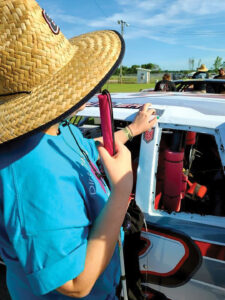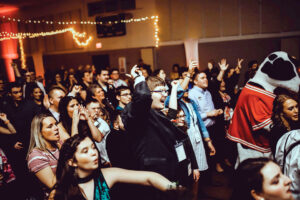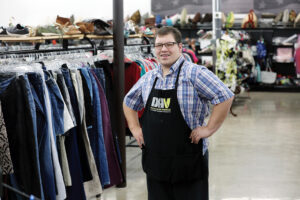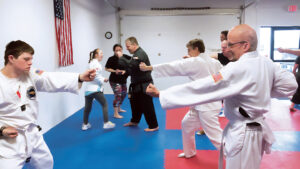Breaking barriers
11/30/2022
Emily Brown dressed up to attend a virtual Night to Shine event in 2021. Photo submitted
Local organizations provide programs and support for adults with disabilities.
Emily Brown loves to sing — and she does it well. The 25-year-old was born with a rare disorder called septo-optic dysplasia, but she hasn’t let that slow her down.
“Even though I do have a disability, I focus more on my abilities and show people that it’s not about my disabilities — it’s about my abilities,” she said.
Brown’s impressive repertoire has included performances on the Bill Riley stage and singing the national anthem at several sporting events, including Iowa Cubs, Iowa Wild and Drake Basketball games. Dirt track races are her favorite. She participates in pageants and has been crowned 2017 Iowa Miss Amazing Jr Miss, 2018 Dreams Made True and 2021 Iowa Miss Amazing (she was national runner-up at the national pageant in Nashville, Tennessee, last year), and 2023 Polk County Ms. Heart of the USA. She also sang for President Barack Obama in 2016.
“I will admit — I’m pretty darn popular,” she joked. Brown, who says she is very outgoing, aspires to be a professional singer and was recently awarded the Kodi Lee Gives Back Grant via the Flutie Foundation. Singer Kodi Lee made waves with his audition for the 14th season of America’s Got Talent, which he won.
“He’s blind and autistic like myself,” Brown said. The nonprofit will work with Brown to jump start her career, starting with professional headshots and recording sessions.
In the meantime, Brown is deeply involved in the local community. She enjoys volunteering with ChildServe, Single Parent Provision and Des Moines Public Schools, takes dance classes at Encore Dance Academy in Ankeny, and is working towards becoming a certified Braille proofreader through the National Federation for the Blind.
Brown also participates in programs through Night to Shine, Train to Inspire and Easterseals — just a few of the several services for adults with disabilities in the Des Moines area.
Organizations like these are key in the lives of individuals with disabilities and their families, removing barriers to recreation, employment and quintessential life experiences. And, often, volunteers and employees find the programs are just as rewarding to them as they are beneficial to participants.

Thanks to Braille Plate Drivers, race car drivers can attach Braille plates to their vehicles to create a more inclusive experience for fans with visual impairments. Photos courtesy of Shelby Klinger
Braille Plate Drivers
Learn more at… mydogtag.com/blog/braille-plate-drivers
Shelby Klinger has been friends with Brown, an avid racing enthusiast, for more than a decade. Klinger, whose boyfriend races at Boone Speedway, wanted to do something special for Emily and searched for a way to include her in the racing experience. She settled on a small metal plate attached to each race car, displaying the driver’s name and car number in Braille.
“Then I thought, if Emily likes this, there’s got to be more people out there who are into racing, and it would benefit them as well,” Klinger said.
Braille Plate Drivers started in 2020 with 25 drivers in central Iowa. Now, it’s grown to include more than 700 drivers across the United States, Canada and Australia.
Participating drivers share their photos and stories on the “Braille Plate Drivers” Facebook group. Interested drivers can order plates via an online form on the page; the $6 fee covers the cost of the plate and shipping.
“Ideally, I think it’d be cool to make it all the way to NASCAR,” Klinger said. “It’d be so great to see the involvement in the community. You know that there’s people out there that are visually impaired, that are watching NASCAR and enjoying it, so it’d be cool to have something inclusive for them.”

Night to Shine guests spend their prom evening with a volunteer buddy. Photo courtesy of Rising Sun Church of Christ
Night to Shine
Learn more at… risingsunchurch.org/night-to-shine
On a special evening each February, churches around the world host “Night to Shine.” Originated by the Tim Tebow Foundation, the evening offers a memorable prom experience for individuals with special needs.
After two years of virtual events, 2023’s Night to Shine returns in person on Friday, Feb. 10. Central Iowa locations include Valley Church in West Des Moines and Rising Sun Church of Christ in Pleasant Hill, where Tracy Hutchinson is the coordinator.
When Rising Sun leaders first approached Hutchinson with the idea of bringing the event to their church, she wasn’t sure she could handle such a formidable task. And yet, here she is, seven years later.
“It turned out to be a huge blessing and an amazing journey to do this,” she said. “To see the looks on their faces when they come into the prom night — the glow, the look, the reactions just absolutely melt your heart. They’re so excited to be there, to be in the moment, to just be themselves, and feel safe and comfortable and just have a really good time.”
Each host church has its own spin on the event, but at Rising Sun, Hutchinson ensures guests receive the star treatment. Each guest is paired with a volunteer “buddy” who spends the entire evening with them. Together, they’ll walk down the red carpet and into an unforgettable experience.

Among its 19 programs, Easterseals offers vocational training for individuals like Dillon Carlson across various local businesses. Photo courtesy of Easterseals
“There’s a whole group of folks standing there cheering them on, telling them how beautiful or handsome they are, and just really encouraging them and just making them feel wonderful,” Hutchinson said.
Special guests can receive corsages or boutonnieres, enjoy a full catered meal, hit the dance floor, get their makeup and hair done and shoes shined, pose for a professional photo, try a photobooth, sing karaoke, or even take a limo ride around the neighborhood. Each one is crowned prom king or queen, with sashes and crowns as a finishing touch.
There is no cost to attend Night to Shine, and thus, Hutchinson relies on monetary and in-kind donations from the community.
“I put it in God’s hands, but it’s pretty stressful trying to come up with just enough money to cover my basic cost,” she said. Donations can be directed to Rising Sun Church, and partnerships with local businesses are always welcome. The church website also includes a link to an Amazon wish list for party supplies.
Rising Sun opens slots for 100 special guests, and with that, needs 100 buddy volunteers each year. Although guests must be at least 14 years old, there is no upper age limit. So far, the church’s oldest guest was 89.
“I just want people to know and understand that this is truly a God thing, and we try to shine his light in everything that we do, and this is just another way to show this group of folks how much they are loved,” Hutchinson concluded. “We just want them to have an amazing night, and like it says, a night to shine.”

Train to Inspire hosts classes at East Coast Tae Kwon Do in Altoona. Photo submitted
Train to Inspire
Learn more at… ttiiowa.org
While well-established organizations like Special Olympics and the Miracle League dominate the scene, a lesser-known nonprofit was founded by Joe Hogan circa 2014. Train to Inspire (TTI) places “seemingly impossible” physical activities within reach for its participants.
“We’re breaking the stigma of what society thinks is possible for people with disabilities,” Hogan said.
“For generations in the past, and still yet today, people with disabilities are told they can’t or shouldn’t, either because of perceived safety issues or people are concerned about liability.
“And we come in and say, bullshit — you can do this. Within reason, you can do most things with a disability, and we can do it next to you.”
Hogan utilizes ingenuity to “push the envelope” in accessibility. One of his favorite TTI programs is a nerf gun battle. He worked with high school students from Waukee’s APEX program to modify and mount an electric nerf gun onto a wheelchair, allowing those with decreased muscle tone to participate independently.
“We’re always trying to do something different,” he said. “If another nonprofit is doing it, I typically stay away.”
TTI participants have also enjoyed rock climbing, go-kart racing, dodgeball, accessible obstacle courses and a slip and slide. Last summer, Hogan created a new event called the “Sky Race” via national fundraiser Over the Edge. He trained an athlete who is blind to climb a 10-story building, using special alpinism and caving gear.
“That’s just an example of the crazy stuff we do,” Hogan said. “And when I say ‘crazy,’ it’s crazy because no one’s ever done it or thought it was possible — but it’s always safe.”
Safety is paramount, but never a barrier. For most activities, a volunteer is right next to the participant. Hogan also ensures that athletes start slowly and take as much time as they need to reach their goal, whether it’s rappelling down a building, running the Grand Blue Mile during the Drake Relays, or simply getting in shape.
Today, due to a shortage of staff and funds, TTI hosts a pared-back version of its programming. They host one-on-one personal training sessions for individuals with intellectual disabilities at BrickHouse Fitness in Bondurant and taekwondo classes by Norman Rigley at East Coast Tae Kwon Do in Altoona. Both welcome TTI into their facilities free of charge.
“The Lohse family in Bondurant has really been good to us,” Hogan said. “And Norm Rigley — he has just been a long-time supporter of the mission.”
In the long-term, Hogan is working to make TTI sustainable, laying the groundwork and finding the funding so he can hire staff. Currently, the organization’s biggest needs are donations and volunteers with fitness and personal training backgrounds.

Ford Eastman is a job coach and assistant manager at Plain Talk Books and Coffee in the East Village, a Raccoon Forks microbusiness. Photo by Sofia Legaspi Dickens
Raccoon Forks
Learn more at… raccoonforks.com
Scattered throughout Iowa are 10 Raccoon Forks microbusinesses, owned and operated by Optimae LifeServices. Through the Raccoon Forks program and other supported employment services through Optimae, more than 200 individuals with mental illness and disabilities are employed.
Multiple studies have shown employment as a significant barrier to individuals with special needs being successful in the community, said Raccoon Forks Coordinator Andrew Bassman.
“This is our way to give employees a valued role and help them on their path to success,” he said. “We try and meet them where they are.”
Known as customer-employees, individuals work with job coaches at River to River Bakery & Pizza in Adel, two retail locations in Ottumwa, a food processing business in Ames and farms in Redfield and Runnells. Microbusinesses in Des Moines include Railroad Bill’s Diner and Food Truck, Raccoon Forks Trading Company (an antique store), and Plain Talk Books and Coffee — all located in the East Village.
Ford Eastman is assistant manager at Plain Talk who started as a job coach two years ago. While his job is to work alongside and support customer-employees, he said he enjoys taking steps back and “phasing them out.”
“You get to see people grow into their own, and it’s just, like, so-and-so is making a whole sandwich by themselves and handling a rush, and it’s no big deal,” he said. “It’s just really rewarding to see customer-employees grow their skill sets and kind of get into their own level of comfort.”
At Plain Talk, customer-employee shifts typically last around 3.5 hours. They make above minimum wage, and those who have graduated from job coaching often make much more.
“The biggest thing I see is, once they’re trained and get in there and get experience, their confidence really grows,” Bassman said. “It’s wonderful to see people start to be a bit more sure of themselves; they get a little money in their pocket. And that confidence starts to spill over into other parts of their lives. Sometimes they just need a safe place to make a few mistakes.”
As with many businesses, staffing at Plain Talk and other Raccoon Forks locations has been challenging. They are currently hiring job coaches and employees who would enjoy the social work aspect of the job.
“It’s a job that can offer a unique perspective,” Eastman said. “It’s more than a paycheck at the end of the day.”
Easterseals Iowa
Learn more at… easterseals.com/ia
One of the largest and oldest nonprofits of its kind, Easterseals has been supporting individuals with disabilities for nearly a century. Each year, its Iowa branch serves about 3,500 individuals throughout the state, including their families, across 19 programs.
“A lot of people think Easterseals’ primary clients are children, and that’s not actually true. We serve far more adults than we do children,” said Krable Mentzer, chief communications officer.
Easterseals programs fall under four key areas of impact: enriching education, elevating community, expanding employment, and enhancing health and wellness.
Through the Supportive Community Living program, Easterseals supports persons with disabilities to live independently in the community. This could look like planning trips to the grocery store, preparing meals or keeping homes clean. Clients and families can opt for either a 24-hour or hourly program.
“Something that sets us apart from other providers is we don’t own the homes we work in, so we’re guests in their home,” Mentzer said.
Also of note, the nonprofit’s Rural Solutions program has been around since the mid-1980s, pioneered by Easterseals Iowa and duplicated across the nation.
“We all know Iowa farmers aren’t going to stop farming; they’re going to keep going,” Mentzer said.
“We help them to do that safely.”
Other services for adults include: Life Club, a day habilitation program; Clients Socially Integrated, a skills-based day program; brain health services; the popular Camp Sunnyside summer program; a lending library and other services through their Assistive Technology Center; and respite camps every other weekend.
Currently, Easterseals’ biggest barrier is finding employees. Waitlists for those who need services are “a mile long,” Mentzer said.
“We have no problem finding people that need the service; we have a huge problem with getting people in the door for employment.”
The nonprofit utilizes some volunteers to help with groundskeeping at camp, special events and activities at Life Club. However, volunteers are unable to provide direct service; only team members can do that. Easterseals currently has more than 30 open positions.
“We have a beautiful training program,” Mentzer said. “It’s all about, ‘Do you have a caring, kind heart? Are you willing to learn?’ If the answers to those two things are yes, we can train you on the rest.
“All of our clients are amazing. We get so much more from them than we ever give to them. They teach us so much.” ♦


















